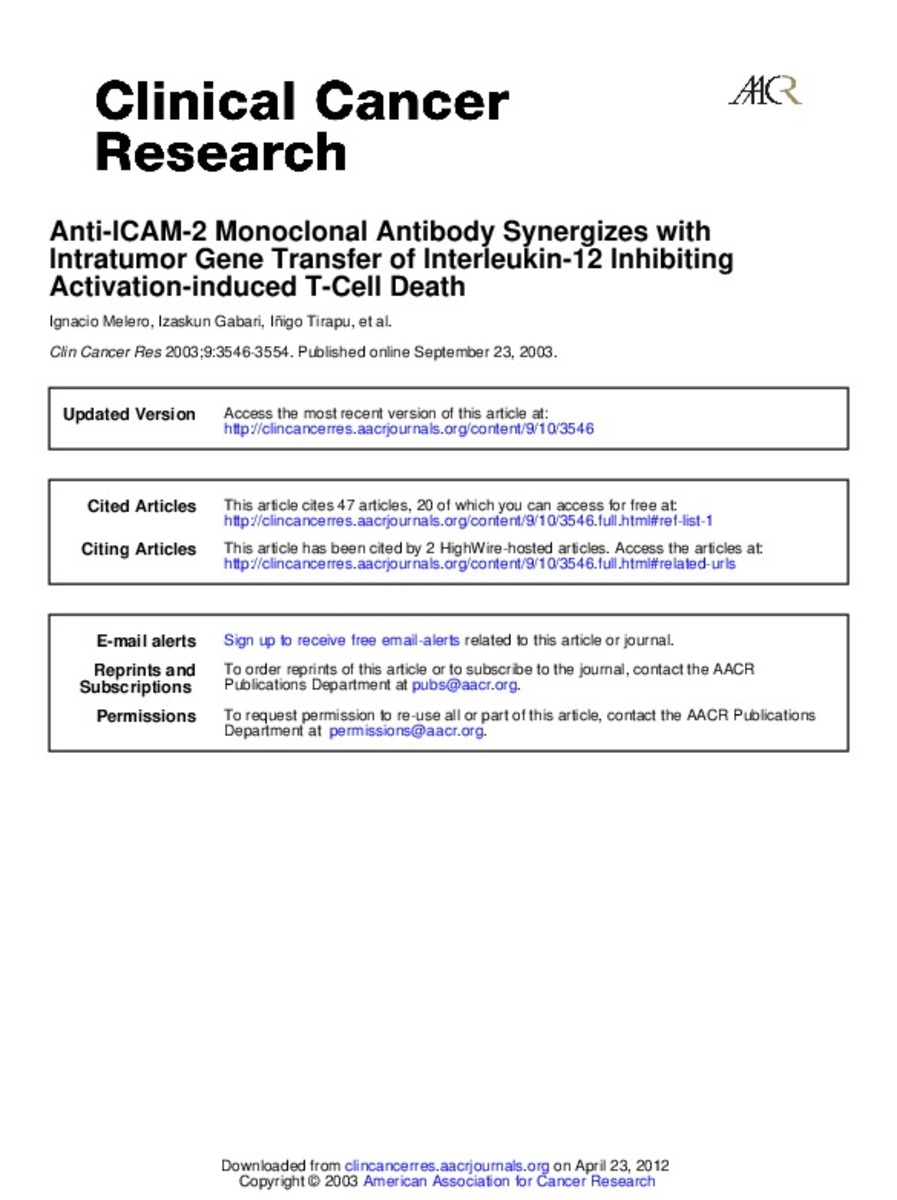Full metadata record
| DC Field | Value | Language |
|---|---|---|
| dc.creator | Melero, I. (Ignacio) | - |
| dc.creator | Gabari, I. (Izaskun) | - |
| dc.creator | Tirapu, I. (Íñigo) | - |
| dc.creator | Arina, A. (Ainhoa) | - |
| dc.creator | Mazzolini, G. (Guillermo) | - |
| dc.creator | Baixeras, E. (Elena) | - |
| dc.creator | Feijoo, E. (Esperanza) | - |
| dc.creator | Alfaro, C. (Carlos) | - |
| dc.creator | Qian, C. (Cheng) | - |
| dc.creator | Prieto, J. (Jesús) | - |
| dc.date.accessioned | 2012-04-24T15:56:03Z | - |
| dc.date.available | 2012-04-24T15:56:03Z | - |
| dc.date.issued | 2003 | - |
| dc.identifier.citation | Melero I, Gabari I, Tirapu I, Arina A, Mazzolini G, Baixeras E, et al. Anti-ICAM-2 monoclonal antibody synergizes with intratumor gene transfer of interleukin-12 inhibiting activation-induced T-cell death. Clin Cancer Res 2003 Sep 1;9(10 Pt 1):3546-3554. | es_ES |
| dc.identifier.issn | 1557-3265 | - |
| dc.identifier.uri | https://hdl.handle.net/10171/21777 | - |
| dc.description.abstract | PURPOSE: Systemic treatment with an anti-ICAM-2 monoclonal antibody (mAb; EOL4G8) eradicates certain established mouse tumors through a mechanism dependent on the potentiation of a CTL-mediated response. However, well-established tumors derived from the MC38 colon carcinoma cell line were largely refractory to this treatment as well as to intratumor injection of a recombinant adenovirus encoding interleukin-12 (IL-12; AdCMVIL-12). We sought to design combined therapy strategies with AdCMVIL-12 plus anti-ICAM-2 mAbs and to identify their mechanism of action. EXPERIMENTAL DESIGN: Analysis of antitumor and toxic effects were performed with C57BL/6 mice bearing established MC38 tumors. Anti-ovalbumin T-cell receptor transgenic mice and tumors transfected with this antigen were used for in vitro and in vivo studies on activation-induced cell death (AICD) of CD8(+) T cells. RESULTS: Combined treatment with various systemic doses of EOL4G8 mAb plus intratumor injection of AdCMVIL-12 induced complete regression of MC38 tumors treated 7 days after implantation. Unfortunately, most of such mice succumbed to a systemic inflammatory syndrome that could be prevented if IFN-gamma activity were neutralized once tumors had been rejected. Importantly, dose reduction of EOL4G8 mAb opened a therapeutic window (complete cure of 9 of 18 cases without toxicity). We also show that ICAM-2 ligation by EOL4G8 mAb on activated CTLs prevents AICD, thus extending IFN-gamma production. CONCLUSIONS: Combination of intratumor gene transfer of IL-12and systemic anti-ICAM-2 mAb display synergistic therapeutic and toxic effects. CTL life extension resulting from AICD inhibition by anti-ICAM-2 mAbs is the plausible mechanism of action. | es_ES |
| dc.language.iso | eng | es_ES |
| dc.publisher | American Association for Cancer Research | es_ES |
| dc.rights | info:eu-repo/semantics/openAccess | es_ES |
| dc.subject | Antibodies, Monoclonal/chemistry | es_ES |
| dc.subject | Antigens, CD/chemistry | es_ES |
| dc.subject | Antigens, CD/immunology | es_ES |
| dc.subject | Cell Adhesion Molecules/chemistry | es_ES |
| dc.subject | Cell Adhesion Molecules/immunology | es_ES |
| dc.subject | Gene Transfer Techniques | es_ES |
| dc.subject | Interleukin-12/metabolism | es_ES |
| dc.subject | T-Lymphocytes/cytology | es_ES |
| dc.title | Anti-ICAM-2 monoclonal antibody synergizes with intratumor gene transfer of interleukin-12 inhibiting activation-induced T-cell death | es_ES |
| dc.type | info:eu-repo/semantics/article | es_ES |
| dc.relation.publisherversion | http://clincancerres.aacrjournals.org/content/9/10/3546 | es_ES |
| dc.type.driver | info:eu-repo/semantics/article | es_ES |
Files in This Item:
Statistics and impact
Items in Dadun are protected by copyright, with all rights reserved, unless otherwise indicated.






